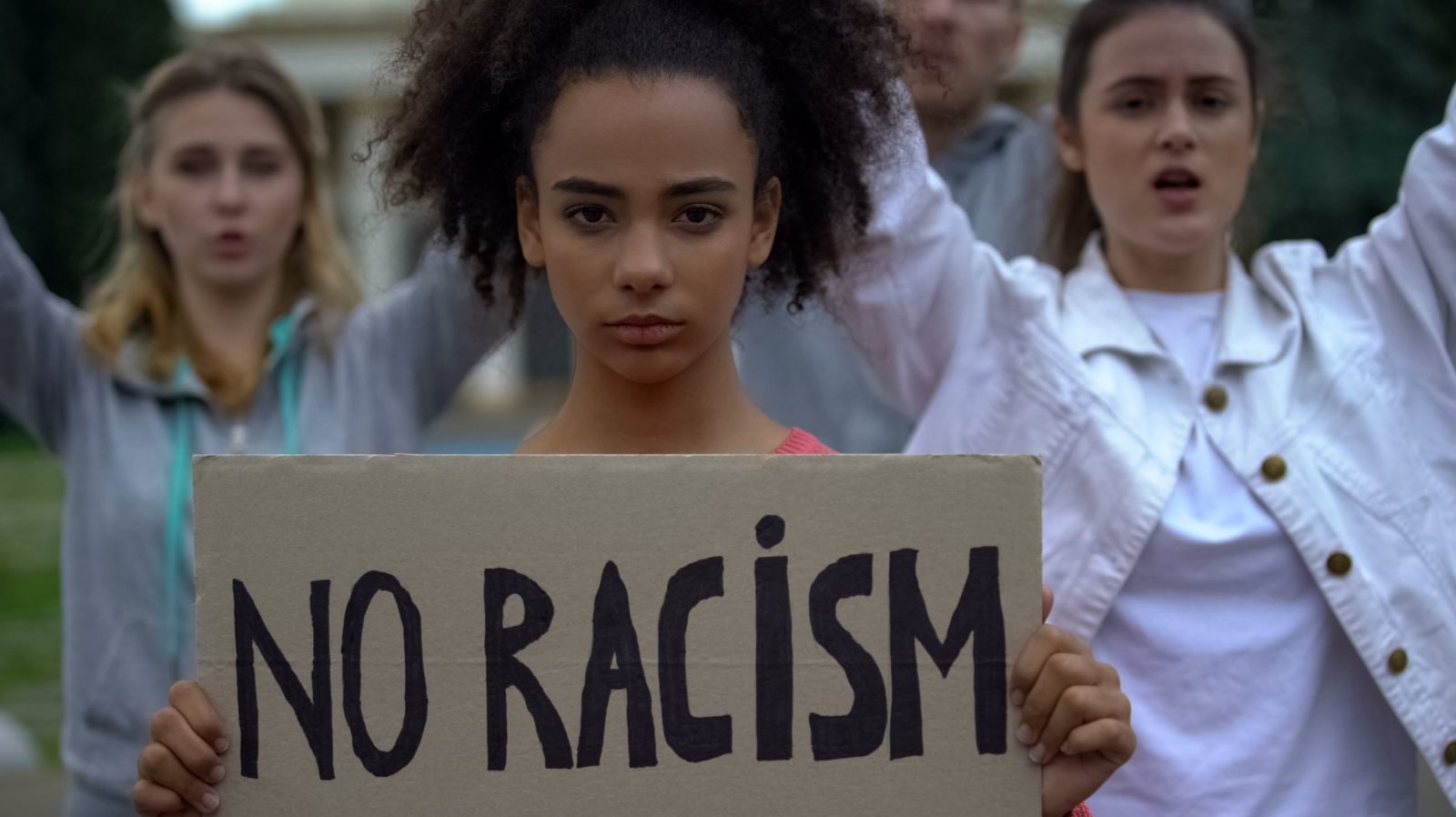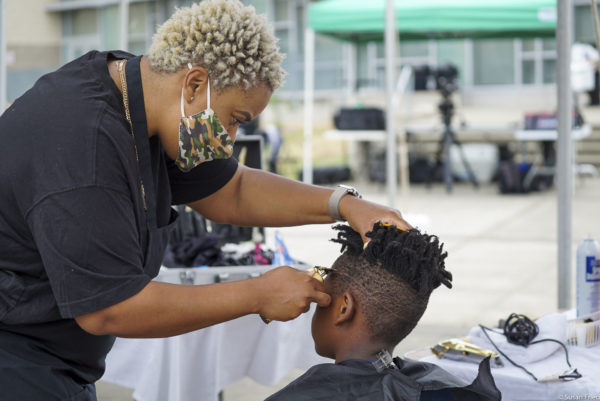Working with Black and African Communities to Support Change

The Human Services Department (HSD) holds deeply our commitment to work with communities of color to ensure equitable outcomes. As February is Black History Month, I will highlight how HSD continues to center race in our work. On behalf of HSD’s extraordinary executive team, we invite you to join us as we celebrate Black history. In doing so, I also invite you to strengthen your commitment to race and social justice and the work of our employee caucuses.
 Black History Month is designed to recognize the achievements of Black Americans and all people of African descent; however, despite the countless contributions of the Black community, we cannot ignore the racial discrimination that continues burden this community. The Department has a role in dismantling structures that perpetuate discrimination of all forms. Here are a few examples of what we’re doing to honor our role.
Black History Month is designed to recognize the achievements of Black Americans and all people of African descent; however, despite the countless contributions of the Black community, we cannot ignore the racial discrimination that continues burden this community. The Department has a role in dismantling structures that perpetuate discrimination of all forms. Here are a few examples of what we’re doing to honor our role.
In June 2020, Public Health—Seattle & King County and boards of health across the United States declared racism a public health crisis. In almost every one of the Social Determinants of Health—the economic and social conditions that influence individual and group differences in health status—you will find disparate outcomes.
One impactful presentation is “The Race Gap – King County, WA,” which illustrates how structural racism has supported health and economic prosperity for White people at the expense of Black people, and the effect on people of African descent over their lifespans.
Addressing Disparities by Leading with Race
Many of you are familiar with the City of Seattle’s Race and Social Justice Initiative (RSJI). To those of you who are new to the department, HSD is committed to identifying and supporting goals that move the department towards an antiracist organization.
While the City adopted the RSJI in the early 2000s, HSD has long been a supporter of undoing institutionalized racism. Some of that work has been referenced by the People’s Institute Northwest, who mentions our department in the 1990 chapter of their online history. Many HSD staff have participated in Undoing Institutionalized Racism, presented by The People’s Institute, and some several times. The training provided by The People’s Institute and others remain an effective way to better understand the far-reaching effects of racial oppression and how organizations can move towards becoming an anti-racist organization.
There is still much work to be done. HSD’s Change Team, an employee-driven team working to advance racial equity, and several race-based caucuses continue to create safe spaces to talk about race and help all staff learn how to lead with race.
Racial Equity Toolkit
HSD supports the use of the RSJI Racial Equity Toolkit. This tool allows users to identify intentional and unintentional acts of institutionalized racism. As we work on Building a Relational Culture, we’ll take a step towards creating safe and empowering workspaces. This requires a commitment to health and healing, both internally and in our communities.
Supporting Safe Communities Division

HSD’s STC division funds Father and Sons Together (FAST), a community-based organization that works to support families and provide opportunities to engage and support youth. Their back-to-school barbershop event helped to empower fathers to be present, positive, and active in their sons’ lives.
Under the direction of Rex Brown, the Safe and Thriving Communities (STC) division continues to invest in services that are both designed for and led by the community. STC in partnership with the Mayor’s Office and others are working to update its Theory of Change. This will allow members of the provider community and service community an opportunity to assist with identifying meaningful ways to mitigate the factors that often lead to gun-related violence and other issues.
STC staff are committed to mentoring Black youth and providing support for people who are re-entering the community following a period of incarceration. As a part of their efforts to reduce the number of criminal justice involved events, STC is also working with organizations that address the disproportionate school disciplinary actions, environmental impacts, and historical conditions that are statistically proven to create inequities. We are so proud to partner with community leaders on this effort- stay tuned for special spotlights throughout Black History Month!
Preparing Youth for Success

Several 2019 Seattle Youth Employment Program participants
Under the direction of Dr. Shukri Olow, our Youth and Family Empowerment (YFE) division continues to invest in mentoring Black youth for success and is actively working to develop a mentorship experience for Seattle Youth Employment Program participants and alums.
Food access is a big part of YFE’s portfolio. The division is also involved in developing an interdepartmental food action plan (for adoption in 2024) that addresses historical barriers to the Black community gaining access to food and nutrition—land ownership, poverty, and access to healthy food. Our farm to table programs source food from local farms, with a strong emphasis on supporting Black business owners and networking among business owners of color.
YFE also offers nutrition education at the preschool level and through the Summer Food Service Program. When young people have access to fresh fruits and vegetables, the whole family experiences greater health and wellbeing.
YFE partners with a variety of community-based organizations, such as Byrd Barr Place, that supports Black families in building self-sufficiency. Access to food resources helps with overall affordability.
Our YFE division administers the Utility Discount Program on behalf of Seattle City Light and Seattle Public Utilities. With savings of 50 percent for Seattle Public Utilities customers and 60 percent for Seattle City Light customers, eligible households that are struggling to get by can save thousands of dollars each year.
Promoting Healthy Aging
Under the direction of Mary Mitchell, our Aging and Disability Services (ADS) division supports affordability and public health. The primary goal of ADS’ care coordination programs is ensuring that older people and adults with disabilities can live as independently as possible, at home when possible, avoiding more costly care environments.
Community meals and home-delivered meals help ensure adequate nutrition. Caregiver support and chore services make a big difference to people who are not as mobile and/or adept as in their younger years. ADS funds and coordinates a countywide network of providers (Community Living Connections) that can answer questions and make referrals in response to changing needs. A large percentage of ADS clients are people of color.

Mayor Norman B. Rice and original members of the Mayor’s Council on African American Elders
ADS has staffed the Mayor’s Council on African American Elders since its inception during Mayor Norman B. Rice’s time in office. In addition, ADS senior planner Karen Winston coordinates three annual events that focus on wellness among people of African descent. Memory Sunday is a community-based event in June in which Black faith communities use the power of the pulpit to disseminate information about brain health and memory care. Grandparents Day is a September event presented in partnership with the Northwest African American Museum, AARP, and other community partners. The African American Caregivers Forum in November focuses on caregiver support, with emphasis on memory care.
Addressing Homelessness
Homelessness continues to be a major issue in Seattle as it is in most large urban cities. While much of HSD’s work in this arena is now the responsibility of the King County Regional Homelessness Authority, our department supports the City’s overarching homelessness efforts. HSD collaborates with other City departments represented on the Unified Care Team to identify and implement a series of solutions that go beyond removals. We are also working to reduce entry into homelessness by supporting these returning citizens with employment and housing.
Continuing the Tradition of Supporting Black History
I want to acknowledge the diversity of our senior leaders at the various levels of our organization. I’d also like to thank these leaders for their leadership despite the many barriers they continue to face. As we continue to work towards an antiracist organization, I recognize there is still work to be done and undone. HSD is committed to doing our part in building a thriving, innovative, and equitable city we are all proud to call home. We are One Seattle.
 Contributor Tanya Kim is Acting Director of the Seattle Human Services Department. She leads over 400 staff who make HSD’s role as a funder, direct service provider, and convener possible. Prior to her current role, Tanya served as the department’s deputy director, Youth and Family Empowerment division director, and on the Seattle Youth Employment Program team. Before joining HSD, she worked at community-based organizations in both direct service and executive level positions.
Contributor Tanya Kim is Acting Director of the Seattle Human Services Department. She leads over 400 staff who make HSD’s role as a funder, direct service provider, and convener possible. Prior to her current role, Tanya served as the department’s deputy director, Youth and Family Empowerment division director, and on the Seattle Youth Employment Program team. Before joining HSD, she worked at community-based organizations in both direct service and executive level positions.
This article originally appeared in the February 2023 issue of AgeWise King County.
![Aging & Disability Services for Seattle & King County [logo]](https://www.agingkingcounty.org/wp-content/themes/sads/images/seattle-ads-logo.png)